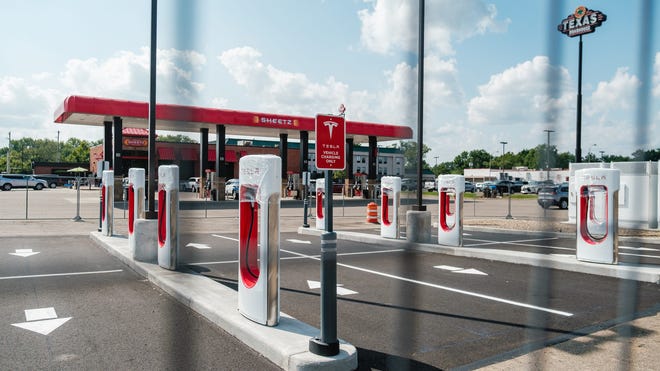Put lies about funding for internet access, EV charging
Claim: ‘Not one dollar’ of $42 billion for internet access is used for that purpose; $7.5 billion spent on seven electric car chargers
Release of Oct. 1 Instagram (direct link, archive link) says billions of dollars meant to expand access to high-speed internet and build charging stations for electric cars have not been spent.
“Kamala Harris and Joe Biden have promised to spend 42 billion dollars (sic) to expand the internet across the country and not one home or business is getting service,” reads the caption, which is image of the poster in X, which was previously there. Twitter. “42 billion dollars. Not one dollar was spent on it.”
It continues, “Pete Buttigieg has promised to spend $7.5 billion to expand electric vehicle charging in America. Only 7 EV charging stations have been introduced in 3 years. We have paid more than $1 billion per charger. ”
The post was liked more than 12,000 times in two weeks. The post on X has been retweeted over 2,000 times. Ohio Sen. JD Vance, the Republican candidate for Vice President, also shared the claim on X.
More from the Fact-Checking Team: How we select and research applications | News email | Facebook page
Our data: False
Officials said the $42 billion fast-track network was designed to be part of a long-term program, so it was expected to spend less this time. But some money has been used by states to plan their projects, and other funds have been authorized to pay for construction once the projects are completed.
The number of charging stations is outdated, as federal funding now supports 20 stations, not seven. And there are plans for hundreds more, the spokesman said.
Some high-speed internet funds used for design, and another billion received for construction
In November 2021, President Joe Biden signed the $1.2 trillion infrastructure bill into law. It included nearly $42 billion to expand high-speed internet access nationwide through the Broadband Equity Access and Deployment program.
To get the money, countries and regions need to make a series of detailed plans on how they will be used and get approval from the National Telecommunications and Information Administration, which oversees the program.
A portion — about $250 million — has already been given to states and localities to help pay for the plan’s implementation, said Charlie Meisch, a spokesman for the agency.
In addition, more than $24 billion was available to states and localities for construction as of Oct. 8, Alan Davidson, the department’s deputy commerce secretary for communications and information, said. said in a speech that day.
Check the details: Biden, Harris flight restrictions did not stop hurricane recovery efforts
Six states are accepting applications from Internet service providers who want to participate in the projects, and five more are expected to begin the process soon, Meisch said. Some states may begin construction sometime next year, though others will be later.
The program is designed on a long-term basis to serve areas that other federal and state programs cannot reach, Meisch said.
He said: “It is established in the law that there should be a long period of time because it is intended to be a cleaning batter that finishes the job.”
More charging stations have been built and hundreds more are planned
Biden’s constitution also includes $7.5 billion for electric vehicle charging — $5 billion for the National Electric Vehicle Infrastructure Program and $2.5 billion for the electric vehicle charging and generation program.
This post is a clear reference to a March 28 report by The Washington Post, titled, “Biden’s $7.5 billion investment in EV charging produced only 7 stations in two years.”
Check the details:Harris new home buyer policy does not exclude siblings, children of homeowners
Two years after the law was signed, the program had “deployed seven open charging stations with a total of 38 places where drivers can charge their cars” in four states, the Post e report back then. But it also said charging stations are being built in four other states, and construction contracts have been awarded to an additional 12 states.
The program has added more in the nine months since then.
Since Oct. 11, there were 20 stations with 81 operational ports in nine countries built with National Electric Vehicle Infrastructure funds, a spokesperson for the Federal Highway Administration told USA TODAY. And those numbers are expected to grow as there are plans underway in 33 states for a total of 3,320 charging ports at 830 charging stations.
Although the cost of installing a charging port varies by location, the average is about $199,000, the Federal Highway Administration said.
USA TODAY reached out to the social media user who shared the post for comment but did not immediately receive a response.
Our sources of information:
- Charlie Meisch, Oct. 11, Telephone interview with USA TODAY
- Federal Highway Administration spokesperson, Oct. 11, email exchange with USA TODAY
- National Telecommunications and Information Administration, accessed Oct. 15, Broadband Equity and Expansion Program
- National Telecommunications and Information Administration, accessed Oct. 15, Time Period
- National Telecommunications and Information Administration, Oct. 8, Architecture for a Better Connected World
- Federal Highway Administration, accessed Oct. 15, National Electric Vehicle Program (NEVI)
- The Washington Post, March 29, Biden’s investment of $ 7.5 billion in EV charging has produced only 7 stations in two years.
Thank you for supporting our media. You can subscribe to our print, ad-free app or e-newsletter here.
USA TODAY is a certified signatory of the International Fact-Checking Network, which requires a demonstrated commitment to impartiality, impartiality and transparency. Our fact-checking work is supported in part by a grant from Meta.
#Put #lies #funding #internet #access #charging
